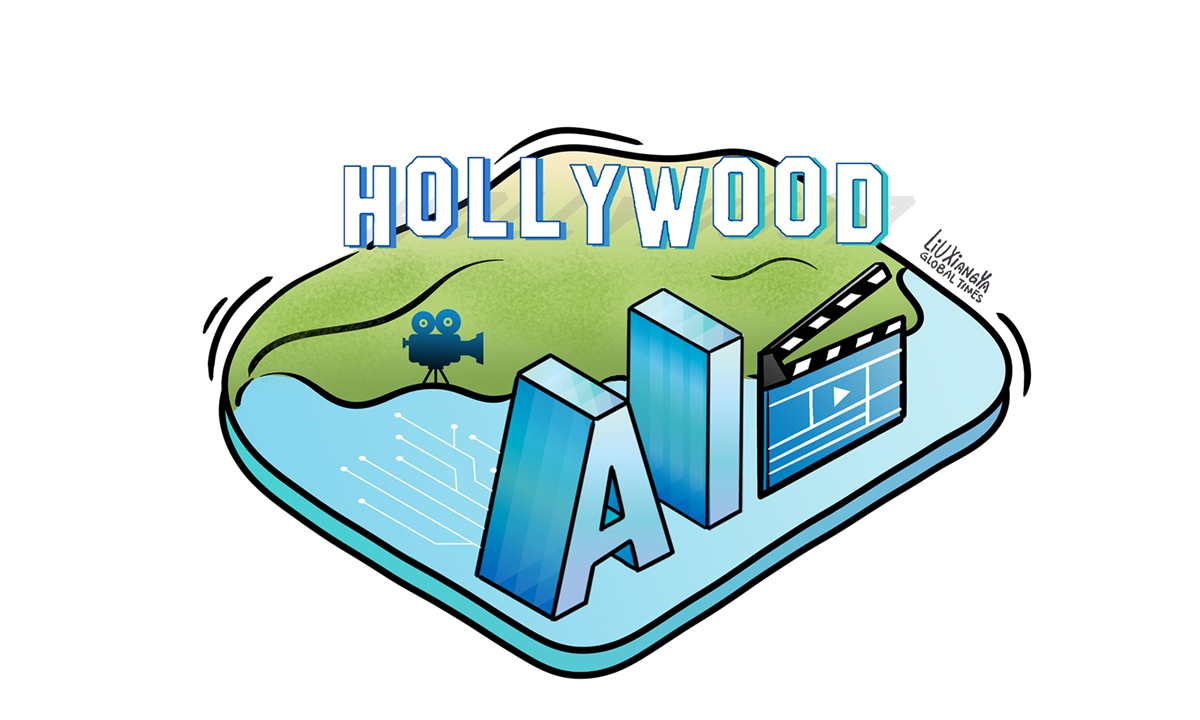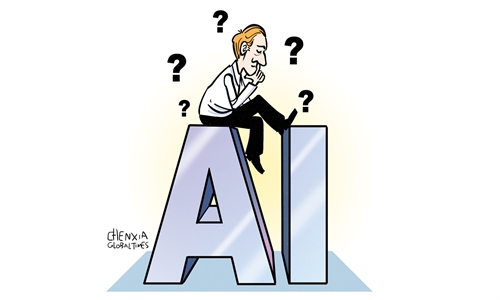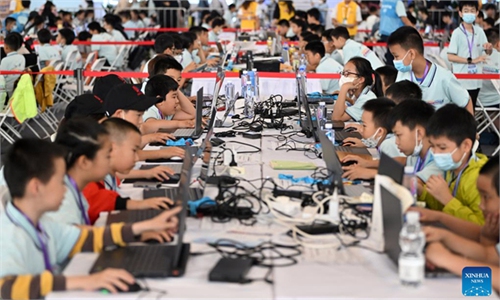
Illustration: Liu Xiangya/Global Times
For the first time in 63 years, both the Writers Guild of America and Screen Actors Guild-American Federation of Television and Radio Artists (SAG-AFTRA) have gone on strike simultaneously, leading to a massive loss of at least several billion dollars for Hollywood. The highly anticipated global premiere of Meg 2: The Trench, scheduled for Friday, had to be canceled in London. The recently announced nominations for the 75th Emmy Awards have also been overshadowed by the strike. If actors refuse to attend or promote the awards, the Emmys could find themselves in an awkward position.
One of the main reasons behind this unprecedented strike is the threat that artificial intelligence (AI) poses to creative professionals. AI, a buzzword in the tech world, has finally arrived in the entertainment industry in the most daunting way, giving rise to an unprecedented battle over AI-related terms. What specific concerns does the SAG-AFTRA have regarding AI?
In Hollywood, where the film and television industry is highly industrialized, AI-driven technology for creating digital avatars has already been widely used to varying degrees. Long before people realized the darker side of this technology, AI was already responsible for miracles like de-aging and voice replication on the big screen. Clearly, real actors do not want digital personas flooding the industry, as this could diminish the space for traditional actors to thrive.
What' worse, a worrisome scenario emerges: If technological progress outpaces the establishment of regulations, actors' identities may be exploited for illicit gains, with the actors themselves remaining unaware of the occurrences. This echoes the recent sixth episode of series Black Mirror, Joan Is Awful, which sees Hollywood star Salma Hayek grapple with the discovery that her AI likeness can be used by a production company without her knowledge.
However, the tide of technology is unstoppable. With the advancement of AI, it is not entirely impossible to see movies starring virtual avatars portraying Hollywood legends like Audrey Hepburn or Marilyn Monroe, who once captivated the world.
Things are a little different in China. In contrast to the relatively rigid Hollywood industry, the Chinese film and television industry, as well as the public's attitude toward AI, appears more accepting and open-minded. In The Wandering Earth II, AI deepfake algorithms were used to make 49-year-old lead star Wu Jing appear in his 20s. The de-aging earned big applause from impressed Chinese moviegoers.
Some Chinese film experts and lawyers pointed out that the arrival of AI has indeed posed certain challenges for actors. Recently, some Chinese idols like Cai Xukun have seen their popularity decline after recent abortion allegations made against Cai. In the future, it is likely that some of these assembly-line-like stars and idols will be replaced by virtual avatars, just like today's virtual idols, that offer less risk, more stable commercial value and greater flexibility.
Although specific policies have yet to be established, with technological advancements, actors with unique and irreplaceable acting skills will likely be retained, while supporting actors and extras with good looks but little in the way of acting ability or who merely perform in the background are the most likely candidates to be replaced by AI.
Meanwhile, if AI is allowed to be used in the film production in the future, some new occupations may emerge like AI character creators who develop AI protagonists, and potentially develop some world-class superstars, as exemplified by the Avatar franchise, which is already exploring this path.
As a pioneering domain for cutting-edge technology applications, the film industry must undergo this transformation. Organizations in the film industry like SAG-AFTRA should consider how to protect themselves within the context of this inevitable trend and refine the industry's development more delicately through the establishment of new laws.
However, current negotiations reveal significant discrepancies between the solutions proposed by the Alliance of Motion Picture and Television Producers and the demands put forth by SAG-AFTRA. SAG-AFTRA is now demanding the implementation of a comprehensive set of terms to safeguard human creativity and actors' rights. As prominent corporations create digital avatars of performers or utilize AI to alter their voices, appearance, or performances, actors demand informed consent and fair compensation.
Perhaps, finding a middle ground and mutual compromise is the key to effectively addressing the issue at hand. By collaboratively resolving these disparities, the industry can create a framework that balances technological advancement and the protection of human artistic expression and dignity.
The author is a Global Times reporter. life@globaltimes.com.cn




